*This page may include affiliate links, which means that if you make a purchase through one of the product links, we may receive a small commission. For full affiliate disclosure please see our disclaimer page.
Today’s article delves into a treat that’s beloved by many and can be hard to resist for our furry friends too – cheesecake! But, “Can Dogs Have Cheesecake?” is a question that most dog parents have grappled with at one point or another. After all, those puppy dog eyes are hard to ignore when you’re indulging in a slice of this creamy, sweet dessert.
In this post, we’ll be sharing insights from some of the most trusted veterinary nutrition experts, aiming to give you a comprehensive understanding of the effects of cheesecake on dogs. Our aim is to provide you with the knowledge you need to ensure your furry friend’s health and well-being. Remember, a well-informed pet owner is the best pet owner! So, whether you’re wondering about the safety of different cheesecake ingredients or looking for dog-friendly alternatives to this popular dessert, you’re in the right place. Let’s unravel the mystery together!

Brief History of Cheesecake
The origins of cheesecake can be traced back to ancient Greece. Legend has it that the famous Greek author and philosopher, Athenaeus, wrote a cookbook containing a recipe for cheesecake in 230 AD. It is believed that the ancient Greeks served cheesecake to athletes during the first Olympic games held in 776 BC.
In medieval times, English monks made their own version of cheesecake using curdled milk and herbs. They introduced their recipe to Europe during the Renaissance period.
In America, cheesecakes were first introduced by European settlers in the late 19th century. However, it wasn’t until the early 20th century that cheesecakes gained popularity in America thanks to an increase in dairy production.
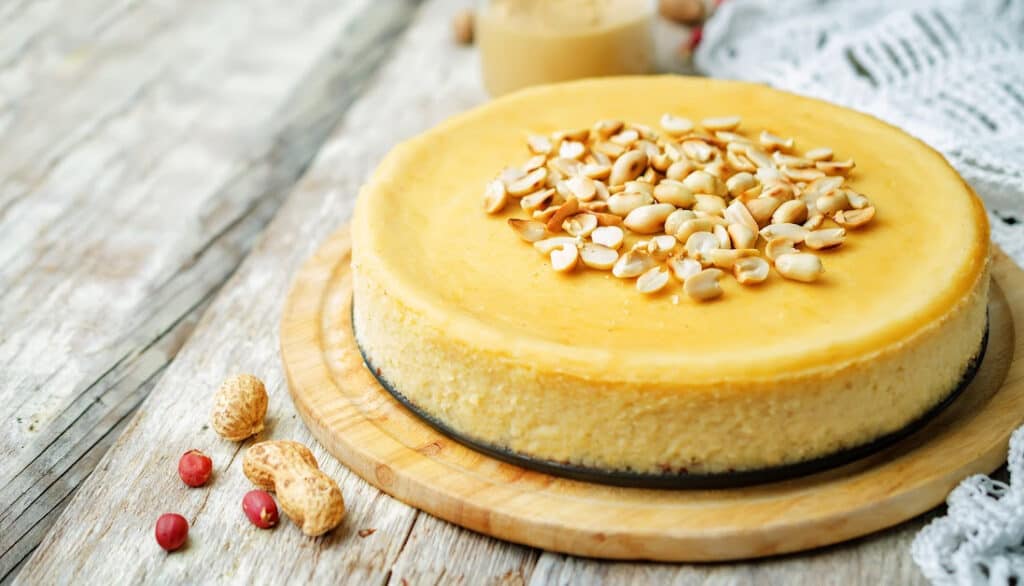
Can Dogs Have Cheesecake?
As a dog owner, you may be wondering whether your furry friend can enjoy this delicious dessert with you. While dogs can technically eat cheesecake as it doesn’t contain any toxic ingredients for them; however,it’s important to consider various factors before giving your dog any form of human food– such as their overall health and diet needs. This article will explore whether it’s safe for dogs to eat cheesecakes made with common ingredients such as cream cheese,sugar,eggs,and flour.We’ll also discuss some potential health risks associated with feeding dogs this sweet dessert.
In addition,we’ll provide you with some dog-friendly cheesecake recipes that are safe and healthy for your beloved pet. Now let’s dive into the ingredients of cheesecake and how they may affect your furry friend’s health.
The Ingredients in Cheesecake
Cheesecake is a favorite dessert of many people, and it’s easy to see why. It has a creamy filling and a delicious crust, making it an irresistible treat. However, cheesecake is not suitable for dogs as it contains ingredients that can cause health problems for them.
Cream cheese
Cream cheese is the primary ingredient in cheesecake, and it’s made from milk and cream. While cream cheese may be safe for dogs in small amounts, too much of it can cause digestive issues such as diarrhea or vomiting.
Cream cheese also has a high-fat content that can lead to obesity in dogs if consumed regularly. A single tablespoon of cream cheese contains around 50 calories, which may not seem like much, but in the long run, it adds up.
- Nutritional value for dogs – Cream cheese does have some nutritional benefits for dogs. It is rich in calcium which helps maintain strong bones and teeth. Additionally, cream cheese contains protein which is essential for muscle growth and repair.
- Potential health risks – High-fat content puts dogs at risk of developing pancreatitis or other digestive issues when they consume too much cream cheese.
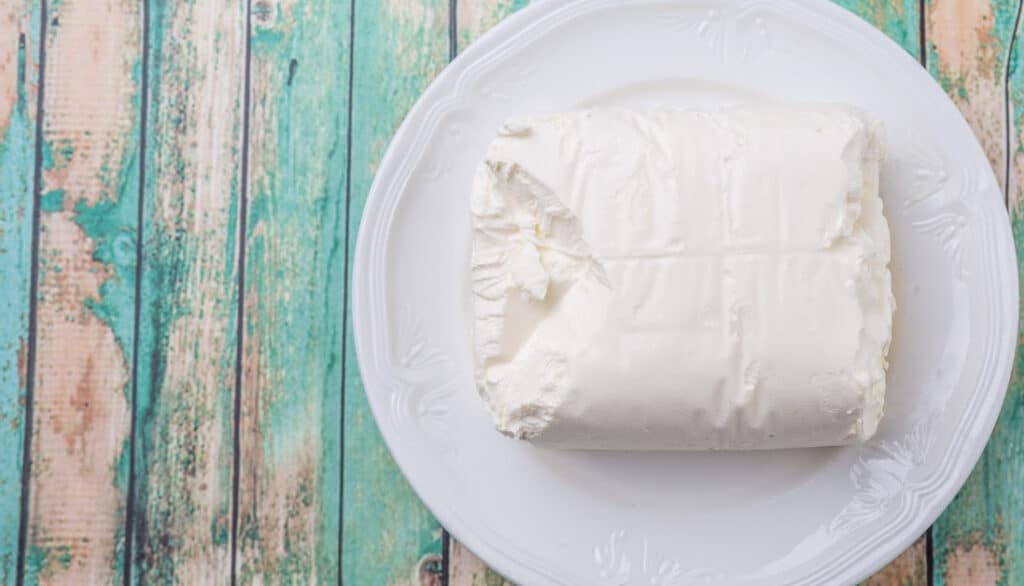
Sugar
Sugar is another ingredient found in cheesecakes that can be harmful to dogs. Excessive sugar intake can lead to obesity and diabetes among other health problems.
- Effects on a dog’s health – Sugar spikes insulin levels causing blood sugar levels to fluctuate leading to diabetes primarily when consuming large amounts over long periods.
- Alternatives to sugar in dog-friendly cheesecakes – Dogs should steer clear of table sugar because there are alternative sweeteners available like honey or applesauce. These substitutes are healthier options that won’t affect your dog’s blood sugar levels while still providing a sweet taste in dog-friendly cheesecakes.
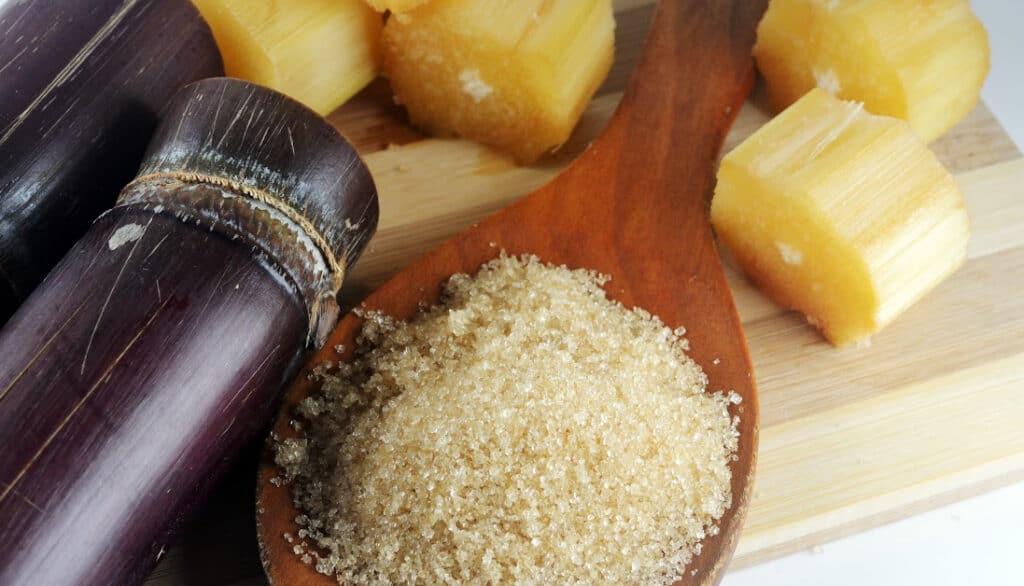
Flour and Eggs
The flour and eggs used to make the crust or filling in cheesecake are not toxic to dogs, but they can still cause health problems if consumed in large amounts.
- Nutritional value for dogs – Eggs contain essential amino acids that dogs need for muscle growth and repair. Flour also contains carbohydrates that provide energy, but it has little nutritional value beyond that.
- Potential health risks – Raw eggs can contain salmonella or E. coli bacteria, which can cause serious illness, including vomiting, diarrhea, and even death. Flour-based products can cause digestive upsets when consumed excessively as wheat-based ingredients alone are already quite unhealthy for all animals. While the ingredients found in cheesecake aren’t necessarily toxic to dogs. The high-fat content from cream cheese or excessive amounts of sugar can lead to health problems such as obesity or diabetes. As a responsible pet owner, it’s essential to limit your dog’s intake of cheesecake by offering healthier alternatives like fruit or protein-based treats instead.

Can Dogs Eat Cheesecake?
Cheesecake is a delicious dessert enjoyed by many humans around the world, but can dogs eat cheesecake too? The answer to this question is yes, but with caution.
While some ingredients in cheesecake are safe for dogs to consume in moderation, there are others that can be harmful or even toxic to them. As a responsible pet owner, it’s important to know what factors you should consider before feeding your dog any kind of cheesecake.
The answer: Yes, but with caution
Cheesecake made with simple and natural ingredients like cream cheese, flour, and eggs can be safe for dogs to eat in small amounts. However, if the cheesecake contains added sugars or artificial sweeteners like xylitol, it can be extremely dangerous for your furry friend. Ingestion of xylitol can cause a sudden release of insulin leading to hypoglycemia (low blood sugar), seizures and even liver failure which could be fatal.
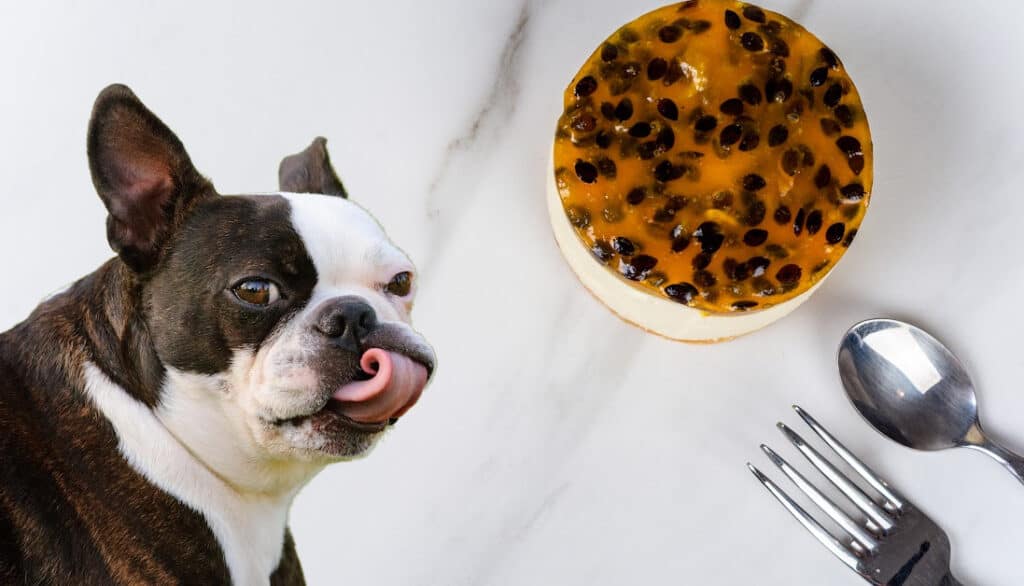
Factors to consider before feeding your dog cheesecake
There are several factors that you should consider before deciding whether or not it’s safe to feed your dog cheesecake. These factors include age, weight, overall health and eating habits.
- Age: Young puppies under six months old have developing digestive systems that may not tolerate rich foods like cheesecakes well; adult dogs over six months old should be able handle limited amounts of safely cooked human food treats such as plain baked chicken or steamed vegetables.
- Weight: Your dog’s weight is important when considering how much food they can safely consume. Overfeeding them fatty foods like cheesecake could lead to obesity which has multiple negative side effects on pets’ health including diabetes and pancreatitis among other ailments
- Overall Health: If your dog suffers from any preexisting health conditions such as diabetes, kidney disease, or pancreatitis, it’s best to avoid feeding them cheesecake altogether. Consult your veterinarian for advice on what kind of food is safe for your dog.
- Eating Habits: If your dog has sensitive stomach or digestive issues, it’s best to avoid giving them any human food treats. Cheesecake might cause gastrointestinal upset and diarrhea in some dogs.
- The amount and frequency of consumption: Even if you decide to allow your dog to eat cheesecake, it should be given in small amounts and only once in a while. Too much cheesecake can lead to obesity which can cause multiple health issues down the road.
While cheesecake can be safe for dogs to consume in small amounts, it’s important to consider all factors related to your pet’s health before deciding whether or not to feed them this dessert. As with any human treat shared with pets, moderation is key – consult with your veterinarian if you’re unsure about the safety of feeding specific foods.

Dog-Friendly Cheesecake Recipes
Now that we have established that cheesecake can be enjoyed by dogs, it’s time to explore some delicious DIY dog-friendly cheesecake recipes. These easy-to-make treats are a great way to spoil your furry friend without compromising their health.
No-Bake Peanut Butter and Pumpkin Cheesecake Recipe for Dogs
This tasty recipe is perfect for dogs who love peanut butter and pumpkin! It’s also no-bake, making it very convenient for those who don’t have the time or the desire to bake. Ingredients:
- 1/4 cup creamy peanut butter (make sure it doesn’t contain xylitol)
- 1/4 cup canned pumpkin puree (not pumpkin pie filling)
- 4 oz cream cheese, softened
- 1/4 cup plain Greek yogurt
- 2 tbsp honeySteps:
- In a large bowl, whisk together the softened cream cheese, Greek yogurt, and honey until smooth.
- Add in the peanut butter and canned pumpkin puree, and whisk again until well combined.
- Pour mixture into silicone muffin cups or ice cube trays. Freeze for at least two hours before serving.
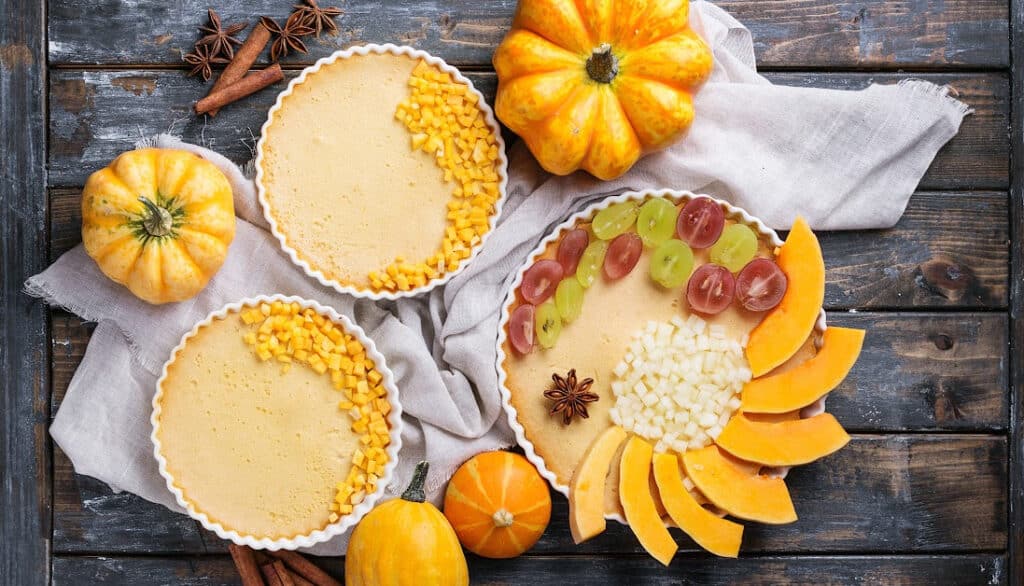
Banana and Blueberry Mini-Cheesecakes Recipe for Dogs
This recipe is perfect for dogs who enjoy fruity flavors! The use of bananas provides a natural sweetness without having to add any sugar. Additionally, blueberries are packed with antioxidants that provide numerous health benefits! Ingredients:
- 1/3 cup mashed ripe banana
- 2 oz cream cheese, softened
- 1/4 cup plain Greek yogurt
- 1/4 cup fresh blueberries, mashed
- 2 tbsp oat flour or almond flour (for binding)Steps:
- In a large bowl, whisk together the softened cream cheese, Greek yogurt, and oat/almond flour until smooth.
- Add the mashed bananas and blueberries to the mixture and whisk again until well combined.
- Pour mixture into silicone muffin cups or ice cube trays. Freeze for at least two hours before serving.
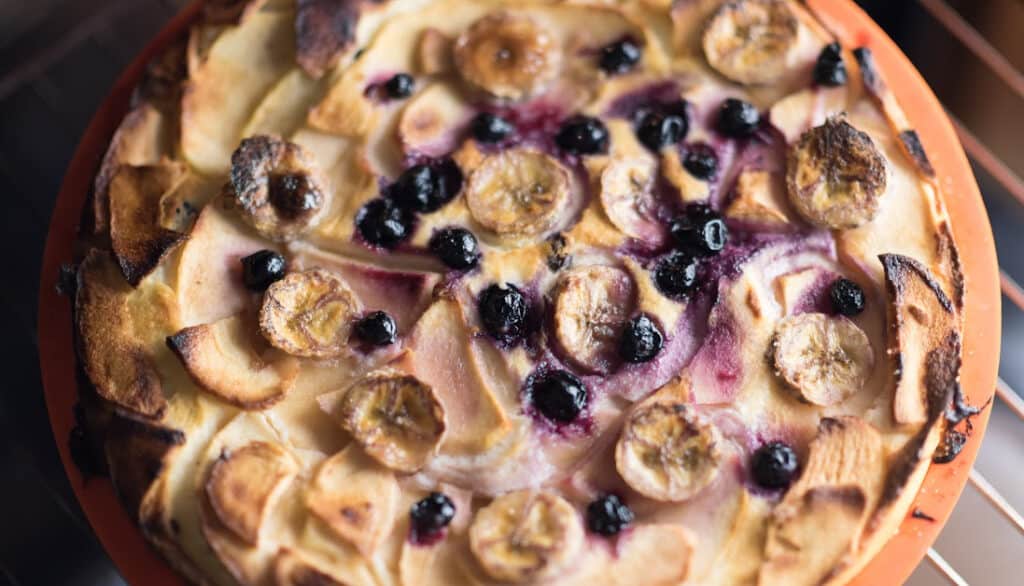
Sweet Potato and Coconut Oil Mini-Cheesecakes Recipe for Dogs
This recipe is perfect for dogs who enjoy a slightly savory flavor profile. The addition of sweet potato provides numerous health benefits as it’s packed with vitamins and minerals. Additionally, coconut oil has anti-inflammatory properties that can help improve a dog’s skin and coat health.
Ingredients:
- 1 small sweet potato (roasted and mashed)
- 4 oz cream cheese, softened
- I/4 cup plain Greek yogurt
Steps:
- In a large bowl whisk together the roasted & mashed sweet potato with the cream cheese ,and greek yogurt until it is smooth.
- Mix in melted coconut oil to the above mix.
- Pour mixture into silicone muffin cups or ice cube trays. Freeze for at least two hours before serving.
These dog-friendly cheesecake recipes are easy to make and delicious to eat! Just remember to always consider your dog’s health needs before introducing any new treat or food into their diet. With these recipes, you can spoil your furry friend while ensuring that they maintain a balanced and healthy diet!

Conclusion
After extensive research, it is clear that dogs can have cheesecake, but with caution. The ingredients in cheesecake, particularly the high sugar content and potential for xylitol toxicity, can be harmful to a dog’s health if consumed regularly or in large quantities.
However, with proper consideration and moderation, cheesecake can be a safe and enjoyable treat for your furry companion. It is important to consider your dog’s age, weight, and overall health before feeding them any type of human food.
If you do choose to give your dog cheesecake as an occasional treat, opt for a homemade recipe using natural ingredients that are safe for dogs. Avoid giving them store-bought cheesecakes or those that contain artificial sweeteners like xylitol. When making dog-friendly cheesecakes at home, consider using alternative sweeteners like honey or maple syrup instead of sugar.
Coconut flour or almond flour can replace traditional wheat flour to make the recipe gluten-free and easier on a dog’s digestive system. Some popular recipes for dog-friendly cheesecakes include no-bake peanut butter and pumpkin cheesecake made with cream cheese, peanut butter, pumpkin puree, and honey; banana and blueberry mini-cheesecakes made with Greek yogurt cream cheese; and sweet potato and coconut oil mini-cheesecakes made with mashed sweet potatoes mixed with coconut oil cream cheese.
While it may be tempting to share your favorite dessert with your furry friend, it is important to prioritize their health by being cautious about the ingredients they consume. With moderation and consideration of their individual dietary needs, you can safely indulge your dog in a delicious homemade cheesecake treat.
~Lindsie
